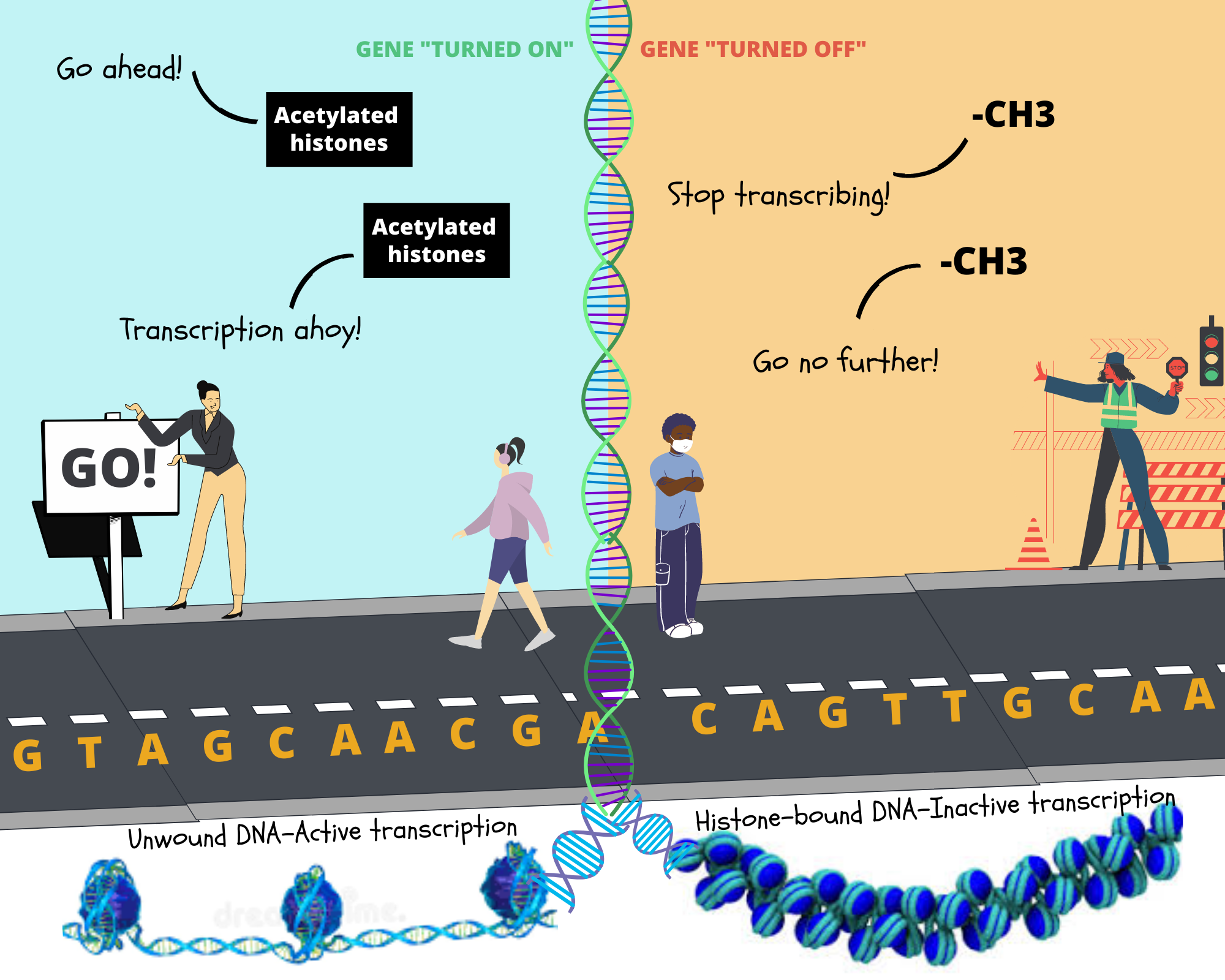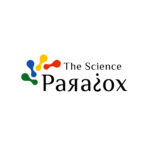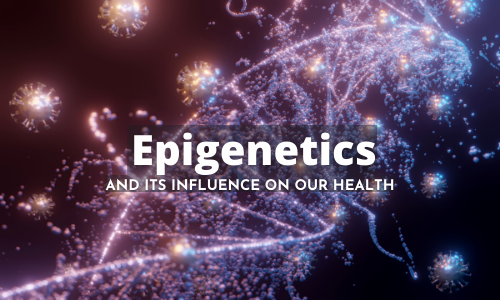Genes play an important role in determining all the traits in our body. A more popular term which all of us have heard is DNA (Deoxyribonucleic acid). The genes are made up of DNA. The DNA is further made up of nucleotides and it forms up the genetic code of our body. Our DNA codes for various proteins and hence instructs the body to carry out all necessary functions, which include growth, development and reproduction.
Now, Epigenetics is the study of inheritable characteristics in our behavior and changes in our environment which regulates the way our genes work. One thing to keep in mind is that epigenetic changes are reversible and do not change the way the code is understood. This is because of the Central Dogma Theory. The ‘Central Dogma’ is a process by which the instructions in the DNA are transformed into a functional product i.e., a protein, after going through an intermediate RNA form. Epigenetic changes contribute to gene regulation and affect our gene expression to turn genes ‘on’ or ‘off’. When genes are turned ‘on’, it directs the specific cells to express the said gene.
A simple and understandable example is that development patterns help differentiate the neuron and the muscle cell. Proteins expressed in both of these cells are the same because of the same DNA. But the differential expression of genes is what allows them to act differently. A brain cell transports various information to all the cells in the body and a muscle cell assists in moving our body parts. Although the DNA in both of these cells is the same, epigenetics makes it possible for the brain cell to turn ‘on’ genes that encode for proteins which will direct it to do its own work and turn ‘off’ genes important for the muscle cell’s work. This is an important process for normal development in a human being. It is possible that diet-related or behavioral changes during development can result in epigenetic changes. This forms a connection between our genes and our environment.

There are three main types of epigenetic changes:
- DNA methylation- In this process a methyl group is added to a specific place on the DNA in a way that does not alter the DNA sequence. This group blocks the proteins used to read the gene. It can be removed by a process called demethylation. So, methylation turns genes ‘off’ and likewise demethylation turns genes ‘on’.
- Histone modification- Histone is a protein which binds with the DNA to form a nucleosome. When the DNA is wrapped around histone, proteins cannot access the genes and hence they cannot be read. So, genes which are turned ‘off’ are present on DNA that is wrapped around the histone while genes which are turned ‘on’ are present on DNA that are not. Histone acetylation helps in increasing transcription of genes by reducing the affinity between histones and DNA, thus unwrapping it and allowing the DNA to be transcribed.
- Non coding RNA- RNA (Ribonucleic acid) is synthesized using DNA and it can be coding or non-coding RNA. While non-coding RNA regulates gene expression, coding RNA codes for proteins. Non-coding RNA has multiple mechanisms to control gene expression but most commonly they induce degradation of coding mRNA before it is translated into proteins. Expression of these non-coding RNA is epigenetically controlled and hence epigenetics ultimately affects the expression of the genes that these non-coding RNA control.

Well now that we have the basic idea of how epigenetics work and why it is important for our body. Let’s take a closer look at how it is connected to our health.
The germs which cause various infections can weaken your immune system by inducing epigenetic changes. Weakening your immune system helps these germs survive and spread. They block the DNA by attaching their own proteins and turn ‘off’ the genes which are not favorable for their survival. Also, the epigenetic modifications in cells of the immune system and the target organ have a role in increasing the development of certain autoimmune diseases.
Cancer is a vast topic to study when it comes to epigenetics. Certain gene modifications and mutations make you more likely to develop cancer or increase your risk to develop cancer. For example, when the BRCA1 gene has a mutation, you are more vulnerable to breast cancer. Cervical cancer is correlated to genetic modification in several classes of genes. Gene modifications wouldn’t necessarily mean modification into a cancerous cell. It only acts as a factor/reason because of which you can be susceptible to developing a certain type of cancer. DNA methylation plays a vital role in understanding modification of genes in cells which can prove to be cancerous in the future. The overall DNA methylation levels are more in normal cells compared to cancer cells. This can help to detect the patient’s cancer at an early stage.
Lately, several scientific reports have associated DNA methylation with neurodegenerative diseases. Inactivation of ‘histone demethylase’ enzyme is connected to autism, Rett syndrome and X-linked mental retardation. Dementia is linked to hyper-methylation of circadian genes. Also, epigenetic processes are usually used to help with neural changes involved in learning and memory and its dysregulation can lead to drug-dependent tendencies and addiction. Drug addiction studies emphasize environmental changes as the primary reason for epigenetic modifications leading to substance dependence. Lifestyle practices like alcohol consumption, stress and lack of physical activity have also been connected to epigenetics.
Drugs based on epigenetics are expensive and some are still being experimented over, but will be available in the near future. Some compounds like Histone deacetylase inhibitors are used in cancer therapy, cardiac hypertrophy and heart failure.
In a nutshell, epigenetics is a huge part of our genetic formation. It’s a relatively less heard topic but a topic of vital importance. Certainly, when our scientists analyzed the human body to be one of the most complex structures, they were no doubt on the right track.
*The above article is not for any professional purpose. Do not rely on it for medical diagnosis. Please consult a medical professional for the same. *
References:
https://www.cdc.gov/genomics/disease/epigenetics.htm
https://www.ncbi.nlm.nih.gov/pmc/articles/PMC5075137/
. . .
Writer

Gargi Phadnis
Gargi a student of class 10th at Ryan International School, Pune. She has always believed that everything related to us is connected to the universe in many ways. She is fascinated by human anatomy and genetics and wishes to know more about it. Gargi also wishes to dive deeper to understand how to interpret the human mind. She wants to pursue a career in medical science while balancing her love for writing. She says, “I would love to enthral everyone with my quirky thoughts, penned down.”
Illustrator

Anushree Krishnamurthy
Co-founder and Director of Website Development and Logistics at The Science Paradox


Excellent article.